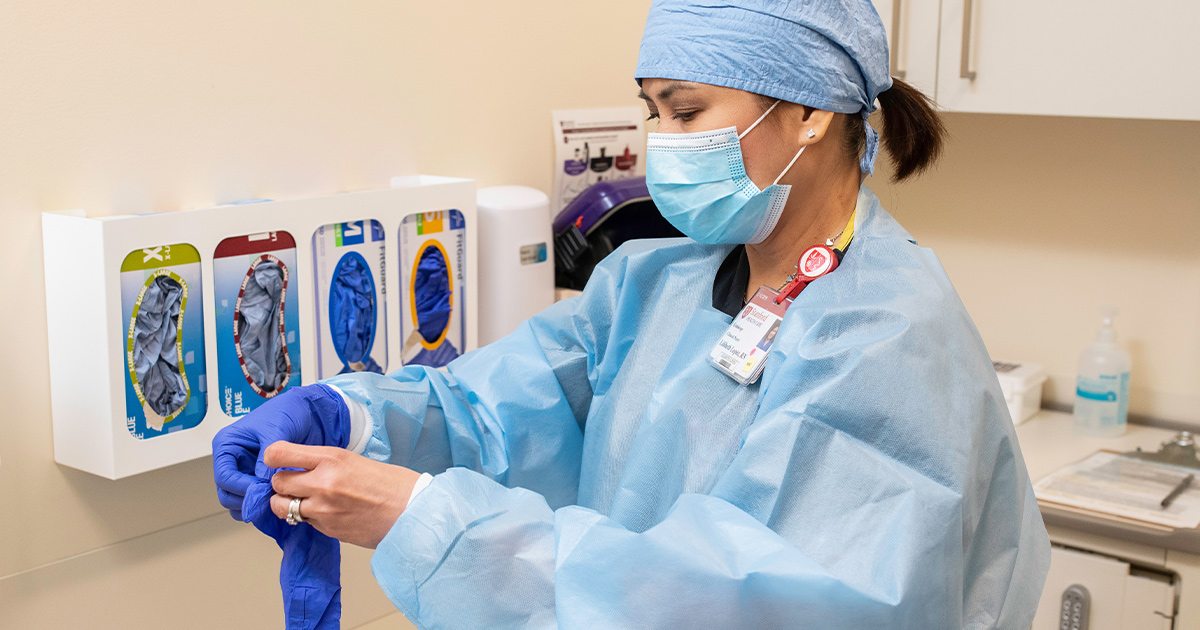Kidney and Pancreas Transplant Program
Leaders in Kidney and Pancreas Transplantation
Our Kidney and Pancreas Transplant Program is one of the most successful in the U.S. We have earned national recognition for transplant outcomes and survival rates while improving our patients’ quality of life.
In 1960, Stanford Health Care performed California’s first kidney transplant. We continue to lead the standard of care, pioneering new treatment methods to use before, during, and after transplantation.
WHAT WE OFFER FOR KIDNEY AND PANCREAS TRANSPLANT CARE
- Personalized evaluation and individualized attention for people with late-stage kidney disease and Type 1 diabetes. Go to Conditions Treated
- Exceptional outcomes with higher kidney transplant success rates than those of other programs. Go to Treatments
- Advanced care from a top-ranked transplant program with a history of innovation and an exciting future, including ways to achieve transplant tolerance. Go to Innovation Highlights
- Team approach from highly experienced specialists who build a treatment plan customized to you, whether you require a transplant for a kidney, pancreas, or both. Go to Your Care Team
- Easy access to care with participation with most major insurers and clinics throughout Northern California for transplant evaluation. Go to Accessing Care
- Clinical trials that may give you access to new therapies, including transplant protocols to reduce the need for immunosuppressive drugs. Go to Clinical Trials
The Stanford Medicine Institute for Immunity, Transplantation and Infection is an interdisciplinary collaboration among physicians, basic and social scientists, and engineers united by their interests in immunology, transplantation medicine, and the prevention and treatment of infectious disease.
Our transplant team provides personalized care for people with kidney failure, also known as end-stage renal disease (ESRD) or end-stage kidney disease (ESKD). With kidney failure, your kidneys can no longer support your body’s needs. Waste builds up in your blood, and you become ill.
We treat kidney failure resulting from many different conditions, including:
- Alport syndrome: Inherited condition that causes kidney damage and affects your eyes and ability to hear
- Berger’s disease (IgA nephropathy): Buildup of immunoglobulin A (IgA) antibody that causes kidney damage
- Congenital nephrotic syndrome: Inherited disorder that causes swelling and high protein in your urine
- Congenital renal obstructive disorders: Conditions that lead to hydronephrosis (urine backup causing excess fluid in your kidneys).
- Diabetic nephropathy or kidney disease: Kidney damage due to diabetes, specifically:
- Type 1 diabetes, due to lack of insulin production
- Type 2 diabetes, often appears later in life when your body can’t manage insulin
- Glomerulonephritis: Damage to the glomeruli (tiny kidney filters), often due to an autoimmune condition
- Goodpasture syndrome: Autoimmune condition in which your body attacks your lungs and kidneys
- Granulomatosis with polyangiitis: Rare condition that causes inflammation of blood vessels in your kidneys, lungs, nose, sinuses, and throat
- Hemolytic uremic syndrome: Condition that affects blood and blood vessels and damages blood vessels in your kidneys
- Hypertension: Chronic high blood pressure that causes permanent kidney damage
- Interstitial nephritis or pyelonephritis: Inflammation in your kidney’s small internal structures
- Lupus (SLE): Chronic autoimmune disease that can affect your skin, joints, kidneys, and nervous system
- Nephrotic syndrome: Condition that involves protein in your urine, low protein in your blood, high cholesterol levels, and tissue swelling
- Polycystic kidney disease (PKD): Genetic disorder that causes numerous fluid-filled cysts in your kidneys
- Among the nation’s top kidney and pancreas transplant programs, starting in 1960 when we performed California’s first kidney transplant.
- Outstanding outcomes for kidney transplant patients at one year after transplantation. Our patients’ results far exceed national averages.
- Highly individualized care throughout the transplantation journey, including before and after transplant.
- A leader in clinical research for transplant tolerance. Tolerance makes it possible for some organ recipients to stay healthy without immunosuppressive drugs after transplantation.
- A rich history of innovation continued by a world-class team that is revolutionizing transplantation.
We are committed to new developments that minimize side effects of long-term immunosuppression and safely increase transplant opportunities.
A transplant is a surgical procedure that replaces a diseased organ with a healthy one from another person who is either living or deceased. Your doctors will work with you to determine which type of kidney transplant is right for you.
Kidney Transplantation
Kidney failure treatment options are dialysis and kidney transplant. Many people choose transplant over dialysis because transplant can lead to better health, improved quality of life, and a greater life expectancy than dialysis.
Deceased donor kidney transplantation
The donor organ comes from a deceased person with healthy kidneys.
Living donor kidney transplantation
A healthy person may donate a kidney for transplantation. Living kidney donors are usually blood relatives, but spouses and friends can also donate.
Living donor kidney transplantation can provide several benefits over deceased donor transplantation, including:
- You may have a shorter wait time.
- There is flexibility in scheduling your surgery date
- A kidney from a living donor may last longer.
If you and your living donor do not have compatible blood or tissue types, you may receive a kidney from another donor or through a donor exchange program. Learn more about paired kidney exchanges and kidney donor chains.
Learn more about living donation.
Kidney-pancreas transplantation
For some people with kidney failure related to Type 1 diabetes, a simultaneous kidney and pancreas transplant may be an option. A healthy pancreas from a donor will produce insulin, helping you control blood sugar levels naturally. After transplant, your new pancreas makes insulin for you, so you no longer need to take insulin.
You may be a candidate for:
- Pancreas and kidney transplant: In a simultaneous pancreas and kidney transplant (SPK), you receive a kidney and pancreas at the same time. This procedure cures diabetes and kidney failure.
- Pancreas transplant after kidney transplant: If you have already received a kidney transplant but are having difficulty managing your diabetes, you may be eligible for a pancreas transplant.
When you receive an organ transplant, such as a kidney, your body considers the new kidney to be foreign. This is especially true when you receive a donor organ from someone with a different blood type. In some cases, this additional barrier can be overcome with desensitization treatments. Examples are ABO-incompatible transplants and transplants after desensitization to preformed antibodies.
When you receive the new kidney, your immune system reacts by producing organ-rejecting antibodies. To prevent organ rejection, your doctor prescribes immunosuppression medications after your transplant.
To reduce the risk of rejection, Stanford Health Care’s Kidney Transplant Program provides a rigorous desensitization program before your kidney transplant. Your desensitization protocol may include:
- IVIG infusions: We give you a high dose of intravenous immunoglobulin (IVIG) over several months. These treatments reduce organ-rejecting antibodies in your blood so you are more likely to find a healthy, successful match.
- Plasmapheresis for ABO-incompatible transplants: If your donor has a different blood type than yours, your body will attack the new organ. We treat your blood so it’s compatible with the donor’s, and you can receive the donor kidney.
Clinical trials are research studies that evaluate a new medical approach, device, drug, or other treatment. Our doctors and surgeons lead several efforts to discover and evaluate new options to improve care for kidney transplant donors and recipients.
Tolerance induction protocol
Stanford Medicine doctors are leaders in pioneering a tolerance induction protocol for kidney transplant. Similar to a stem cell transplant (bone marrow transplant), this method implants stem cells from your kidney donor along with the kidney.
Unlike stem cell transplants for cancer, tolerance induction seeks to create a hybrid, or mixed, immune system. This hybrid system combines your immune cells with your donor’s immune cells. The goal is to reduce the risk of kidney rejection and eliminate the need for immunosuppressant medications. When effective, recipients can take less medications or none at all.
Stanford Medicine pioneered clinical studies of tolerance induction in 2000. This work demonstrated that tolerance induction can be achieved in 80% of human leukocyte antigen (HLA)-identical living donor pairs. HLA-identical pairs can only be siblings. Each sibling pair has a 1 in 4 chance of being HLA-identical. This protocol is now under trial at other transplant centers in the U.S. and internationally.
The protocol has been adapted for use in HLA-mismatched living donor pairs in another clinical study. Select donor-recipient pairs who qualify and live within two hours of Stanford Health Care may be eligible to participate. If you have a living kidney donor, please feel free to talk to our kidney transplant team about whether you might be a candidate.
Other clinical trials
As a Stanford Health Care patient, you may be eligible to participate in open clinical trials to evaluate new breakthrough treatments. Open trials refer to studies that are currently recruiting participants or may recruit participants in the near future. Closed trials are not currently enrolling, but similar studies may open in the future.
Excellence in Quality and Outcomes
Excellence in Kidney Transplant Quality and Survival
Stanford Health Care’s Kidney Transplant Program is nationally recognized for its excellent quality and success rates for kidney transplantation. The transplant program exceeds the national average for survival after kidney transplantation (according to the Scientific Registry of Transplant Recipients). You will benefit from:
- Faster kidney transplantation: Stanford Health Care’s program allows for a kidney transplant sooner as our program has a higher kidney acceptance rate compared to the national average. Accepting more organs means we can provide faster access to transplants and lessen the wait times.1
- Excellent survival rates: Kidney transplantation survival rates at Stanford Health Care are better than the national average for one year and three years after transplantation for patient and graft (kidney). Stanford’s living donor kidney recipient 3-year graft and patient survival are 100%.
|
1
|
1
STANFORD HEALTH CARE RATES |
1
NATIONAL AVERAGE RATES |
|---|---|---|
|
1
Patient 1-year survival post-transplant |
1
97.07% |
1
96.27% |
|
1
Graft (kidney) 1-year survival post-transplant |
1
97.42% |
1
94.09% |
|
1
Patient 3-year survival post-transplant |
1
93.71% |
1
92.98% |
|
1
Graft (kidney) 3-year survival post-transplant |
1
91.90% |
1
89.99% |
Excellence in Kidney-Pancreas Transplant Survival
Stanford Health Care continues to achieve 100% patient survival outcomes at one and three years after kidney-pancreas transplantation.1
Our program’s results speak to the consistency and thoroughness with which we care for patients over time. To learn more about statistics related to kidney and kidney-pancreas transplantation, visit the Scientific Registry of Transplant Recipients.
What to Expect
Donating a healthy kidney can save someone’s life. Learn more about Living Donation.
Preparing for Kidney Transplantation
Donors do not need any special treatments before surgery. They arrive at the hospital the day before surgery, along with the kidney recipient, for one more evaluation. Normally, the donor and recipient stay in the same unit the night before surgery. On the day of surgery, the donor’s surgery is first with the recipient’s surgery immediately following.
Kidney Donor Surgery
Doctors remove kidneys in a surgical procedure called a nephrectomy. Surgeons can perform living donor nephrectomies using traditional open surgery or minimally invasive procedures.
Most living donor nephrectomies are laparoscopic procedures that require only a few small incisions to remove the kidney. Compared to open surgery, minimally invasive surgery usually results in a shorter surgery time, hospital stay, and recovery period.
At Stanford Health Care, we offer two types of minimally invasive procedures to remove donor kidneys, including:
Laparoscopic nephrectomy
In this procedure, the surgeon makes two or three small incisions in the abdomen. The surgeon inserts a laparoscope—a tiny tube with a camera and specialized surgical instruments.
The laparoscope’s camera displays and magnifies the image on a monitor, allowing the surgeon to see small details not visible with open surgery. The surgeon removes the kidney through one of the incisions.
Donors who undergo a laparoscopic nephrectomy usually stay in the hospital for one to two days and can resume normal activities after four weeks.
Robotic-assisted nephrectomy
Stanford Health Care’s Kidney Transplant Program is the first in Northern California to use robotic-assisted surgery to perform living donor nephrectomies. Robotic-assisted surgery enhances surgeons’ capabilities for complex procedures in hard-to-reach areas, like the abdomen. Similar to laparoscopic surgery, robotic-assisted surgery requires only a few small incisions to see, reach, and remove the kidney.
After inserting highly specialized instruments in the small incisions, the surgeon sits at a nearby console to view the abdomen and perform the surgery. The robotic surgical system produces greatly magnified, 3D images of the abdomen in real time. The surgeon guides the system’s surgical instruments, which have greater range of motion and precision than the human hand and wrist.
Donors who undergo robotic-assisted surgery typically stay in the hospital for one to two days. Most can return to normal activities in four weeks.
Download the Living Kidney Donor Facts & FAQs in your preferred language:
English | Chinese | Spanish | Tagalog | Vietnamese
You can save a life.
Be a living kidney organ donor.
Learn more about living donation.
Your Kidney and Pancreas Transplantation Team
At Stanford Health Care, you have access to leading experts in kidney and pancreas care and transplantation medicine. Our team offers complete transplant evaluation and education for transplant recipients and living donors, with pancreas transplantation available for certain people with diabetes.

Your Providers
Transplant Surgeons
Transplant surgeons are doctors who specialize in organ transplantation. They perform the transplant surgery and oversee your care in the hospital after transplant.
View All {0} Transplant SurgeonsTransplant Nephrologists
Nephrologists are doctors who diagnose and treat conditions affecting the kidneys. Transplant nephrologists have advanced education and training in organ transplantation. They evaluate you before putting you on the transplant list and care for you after transplant.
View All {0} Kidney Transplant NephrologistsAnesthesiologists
Anesthesiologists are specialists who administer anesthesia for pain management during surgical procedures, including organ transplantation. They also manage and treat any changes in your critical life functions—breathing, heart rate, and blood pressure—during surgery.
View All {0} Anesthesiologists
Extended Care Team
Pre-Transplant Patient Care Coordinators
Pre-transplant patient care coordinators are your first point of contact. They schedule your appointments with the team for evaluation, tests, and other services to complete the evaluation process. Patient care coordinators work closely with pre-transplant nurse coordinators to help you navigate the entire evaluation process.
Pre-Transplant Nurse Coordinators
Pre-transplant nurse coordinators manage your evaluation process once you are referred to us for kidney or pancreas transplantation. They help you understand the physical and psychosocial implications of a transplant. These nurses also obtain your medical history and testing from your doctors and let you know about upcoming appointments and tests. They monitor your health while you are on the organ waitlist before transplant surgery.
Post-Transplant and Outpatient Nurse Coordinators
Post-transplant nurse coordinators organize all aspects of your care after your transplant. Before you leave the hospital, they provide you with the education you need to be successful after your transplant. They teach you to recognize signs and symptoms of infection and rejection, and how to take your prescribed medications. Your nurse coordinator manages your outpatient care when you come to the clinic and serves as your primary contact for your post-transplant needs.
Post-Transplant Patient Care Coordinators
Along with your nurse coordinator, post-transplant patient care coordinators help coordinate your post-transplant care. They schedule your clinic appointments and tests, track test results, and manage your medication refills.
Advanced Practice Providers
Advanced practice providers include nurse practitioners and physician assistants. They work with transplant surgeons and nephrologists to manage your care before and after your transplant.
Independent Living Donor Advocates
Independent living donor advocates (ILDAs) are responsible for making certain that the rights of a potential living kidney organ donor are fully represented. ILDAs serve as resources and advocates for living donors from the time they contact the transplant program through post-donation.
Transplant Dietitians
Transplant dietitians help transplant recipients and their families learn about a healthful, enjoyable diet to speed recovery after surgery and maintain health throughout life. They also provide education and care before and after an organ transplant to people with diabetes through the Transplant Diabetes Program.
Transplant Pharmacists
Transplant pharmacists work closely with you to ensure that your medications are correct after your transplant. Before you leave the hospital, the transplant pharmacist teaches you about your transplant medications. They make sure you are on the correct types and doses of medications and monitor for interactions between medications.
Diabetes Educators
Diabetes educators work with the rest of your team to coordinate comprehensive, quality care to help you and your family manage diabetes after your transplant.
Physical Therapists
Physical therapists help you regain your strength and function with movement and endurance exercises after your transplant.

Support Services
We offer a vast array of support services to help you feel your best throughout your care, from diagnosis through treatment and recovery.
Our Patients
Watch a patient story: Why Become a Living Kidney Donor? Thaderine's Inspiring Story
Read a patient story: Double transplant at Stanford saves life of critically ill COVID-19 patient
The Stanford Kidney and Pancreas Transplant Program developed educational materials to help patients and caregivers understand transplant surgery. We encourage you to write down any questions and ask your doctor.
- Kidney Transplant Overview Video available in English, Spanish, Tagalog and Vietnamese.
- Kidney Transplant Evaluation (Pre-Transplant) Information
- Living Donor Information
Related Programs and Services
Learn more about the programs and services associated with the Stanford Health Care Kidney and Pancreas Transplant Program:
Other Resources
You can find detailed information about transplantation options at many organizations, including:
Kidney and Pancreas Transplant FAQs
UNOS provides current statistics about how many people are waiting for a kidney or pancreas.
Most donor organs come from deceased donors. Many of these donors are adults who became critically ill and did not survive their illness. Donors can come from anywhere in the United States.
Family members or unrelated people who make a good match may also be able to donate one of their kidneys. This type of transplant is called a living donor kidney transplant. People who donate a kidney go on to live healthy lives with their remaining kidney.
Yes, it's possible to receive a kidney transplant faster through a living kidney donation. Sometimes patients can receive a living donor transplant within a couple of months compared to 6-10 years with a deceased donor. Learn more about Stanford Health Care’s Living Donation Program.
UNOS offers an online tool for viewing the national annual figures for:
- Kidney transplants
- Pancreas transplants
- Kidney and pancreas transplants
To be considered for a new organ, your medical team completes an extensive evaluation, including:
- Blood tests
- Diagnostic tests
- Psychological and social evaluation
If your doctor determines you are a good candidate for transplantation, you will be placed on the UNOS kidney transplant waitlist.
UNOS manages transplant organ distribution in the United States. They are responsible for allocating many types of transplants, including kidney and pancreas.
Hospitals and medical centers throughout the country report patients’ transplant needs to UNOS. Your medical transplant team stays in contact with UNOS and updates them as your condition changes prior to transplant.
When a donor organ is available, a list of potential recipients is generated. Most deceased donor kidneys are transplanted to a nearby recipient. Some travel across the country to be transplanted in the appropriate patient.
Time on the organ waitlist varies from a few days to years. During this time, you receive close follow-up with your doctors and transplant team. Support groups can help during the waiting time.
In most instances, we notify you by phone that an organ is available. You need to be ready to come to the hospital immediately to prepare for the transplant.
Many people live long, active lives after receiving a kidney transplant, pancreas transplant, or both. However, living with a transplant requires special consideration and care.
You will take immunosuppressive medications to prevent your immune system from attacking your transplanted organ. You must also take other medications to prevent side effects of a suppressed immune system, such as infection. We are with you to ensure long-term success of your transplant.
For Referring Physicians
PHYSICIAN HELPLINE
Fax: 650-320-9443
Monday–Friday, 8 a.m.–5 p.m.
Stanford Health Care provides comprehensive services to refer and track patients, as well as the latest information and news for physicians and office staff. For help with all referral needs and questions, visit Referral Information.
You may also submit a web referral or complete a referral form and fax it to 650-320-9443 or email the Referral Center at ReferralCenter@stanfordhealthcare.org.
International Patients
Phone: +1 650-723-8561
Email: IMS@stanfordhealthcare.org
To make an appointment with one of our kidney transplant specialists, call: 650-725-9891.






